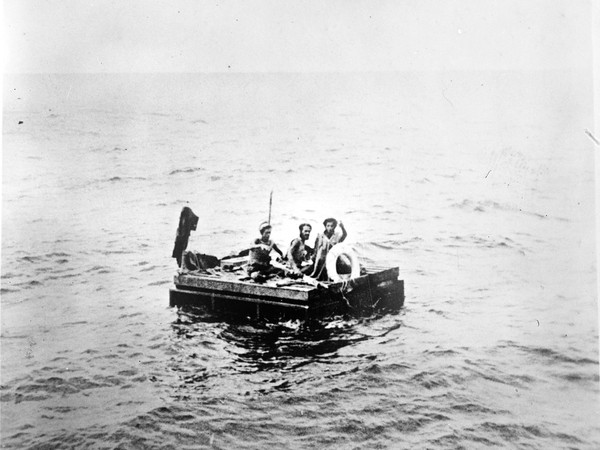
Prayer Protected a WWII Sailor 83 Days on a Raft
19-year-old Basil Izzi was soaked, freezing, and tired of kicking away the sharks that were trying to eat him. He had been hanging onto a piece of wreckage from the Zaandam, which sank by being hit by torpedoes from a Nazi submarine two days before on November 2, 1942. Izzi was part of an armed American guard protecting the Dutch ship as it carried war supplies.
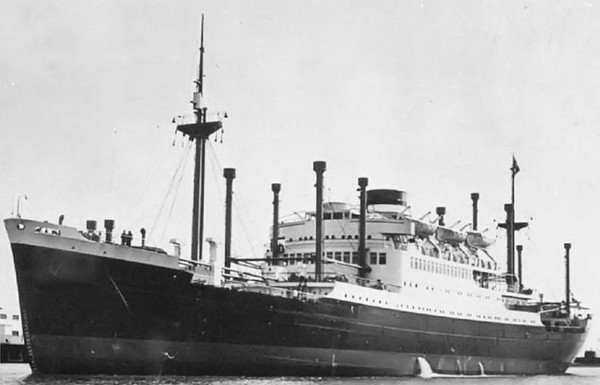
The Zaandam.
Hope was in sight. He spotted a raft with other survivors on it, and he swam towards it with all of his might. After swimming for what felt like a year, he reached the raft. One of the survivors held out an oar for him to grab and he climbed on board. Izzi would spend the next 81 days of his life floating on that raft on the never-ending expanse of the open sea.
These were the five men on the raft:
- Basil Dominic Izzi, whom we already met, was a 19-year-old with Italian heritage from South Barre, Massachusetts.
- James Maddox was in charge of Izzi’s guard. He was “a sensitive, scholarly young man who had taught speech at Purdue University.” 1
- George Beezley was a repatriated American sailor from Hannibal, Missouri.
- Cornelius van der Slot was Dutch and a Zaandam crew member.
- Nick Hoogendam was a 17-year-old Dutch merchant mariner who had been a seaman since he was 12. 2
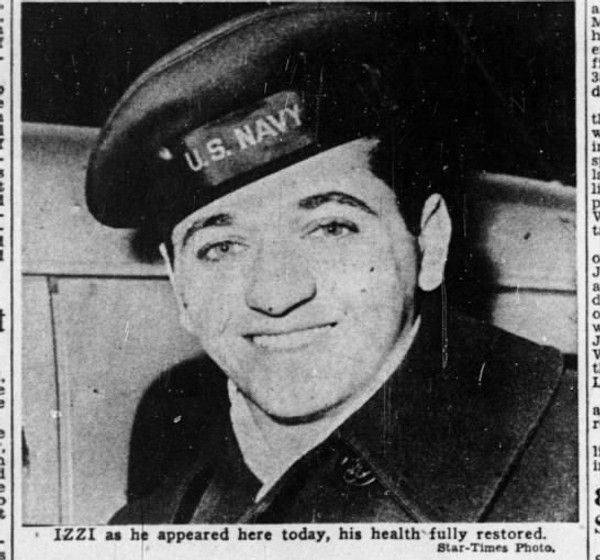
Basil Dominic Izzi.
The next two and a half months brought hunger, sickness, and death. Beezley died on day 66 and Maddox on day 70. They were given burials in the water. Izzi was the only American on the raft to survive. He attributed his perseverance to prayer and faith in God.
Faith in God
Mark Murphy, a personal acquaintance of Izzi who wrote a book about him, said that “There were no discoveries or rediscoveries of God on this raft” 3because all the men were religious. Izzi was a Catholic, and the others were Protestants. Maddox was a Baptist and had studied for the ministry for a while before deciding to become a teacher, so the others asked him to hold nightly prayer services. He prayed aloud in these semi-formal services for several weeks but stopped because praying aloud unmasked the hopes and fears they all had in their hearts. They continued to pray, but they did so silently. In addition to these nightly prayers, they would spend all day Sunday praying. Izzi never lost hope because, he said, “I knew God was with me all the way.” 4
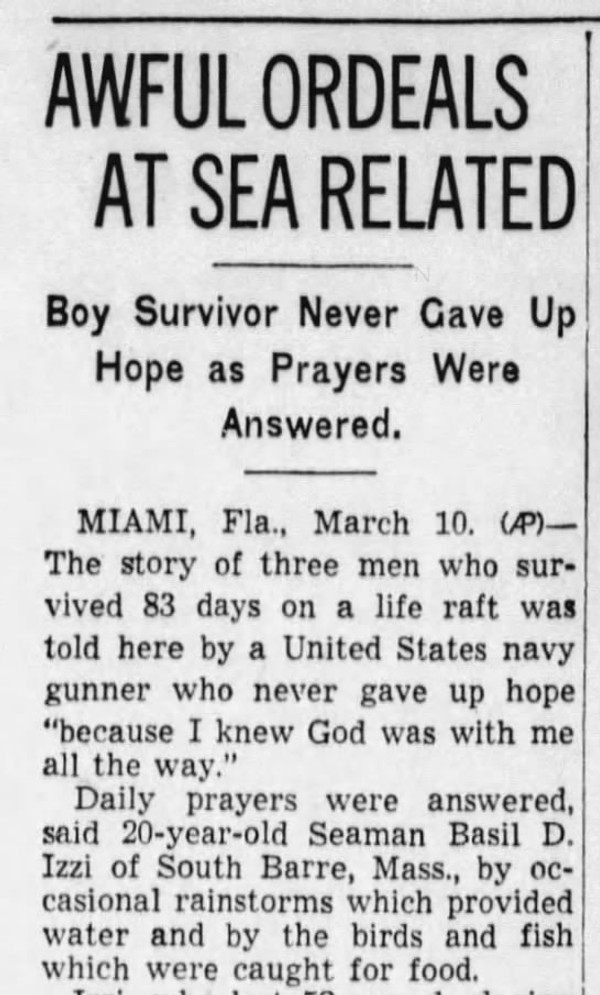
Prayer Answered
They learned to ask God not only for rescue but also for their daily food. There were food and water rations on the raft, but the food ran out after 16 days and the water after 23 days. The first time that it rained was the day after they finished their water supply. They collected six gallons of rainwater. 5
As they prayed and saw answers to their requests, Izzi saw the men’s attitude towards prayer change. He said, “The skies would be blue and cloudless. We would pray for rain, and within maybe a couple of hours—or at least the next day—a dark cloud would suddenly appear, and rain would come.” 6
Instead of bringing many requests to God at one time, they learned to pray for one thing at a time. Sometimes a man would say aloud, “Oh God, help us tomorrow.” If he caught a fish the next day, he felt his prayers had been answered. 7The best meal they had was on Thanksgiving Day. An albatross flew by, and one of them lunged over the side of the raft to catch it while two of the others grabbed his feet to keep him from falling into the ocean.
They also caught bigger game than birds or fish. They wiggled their toes in the water to attract sharks and lassoed them with a rope. It took four of them to hold the shark while the last man stabbed it with the one knife they had. You can see a video clip of Izzi talking about killing the shark here.
When they weren’t praying for food (and deliverance) or catching food, they talked about food. They remembered past meals and dreamed about future ones. Izzi said, “We fairly drooled when we talked about it, but we couldn’t avoid the subject. The diet of raw fish and birds on which we lived after our food ran out only stimulated our conversation.” 8
The raft had drifted over 2,200 miles to where it was finally rescued.
Rescue
On January 24, 1943, they saw a boat on the horizon. It wasn’t the first one they had seen. They had seen three other ships, but they weren’t able to get the attention of them as they passed by. This time, though, their greatest prayer was answered—the boat saw the raft and picked them up. The ship took them to Brazil to recuperate for several weeks until they were strong enough to return home.
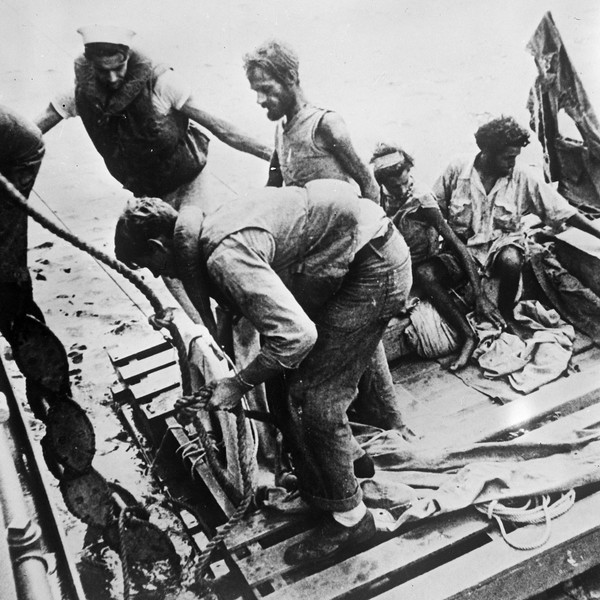
Izzi and his two crewmates being helped off the raft.
Izzi escaped the experience without trauma or mental illness. Mark Murphy spent a considerable amount of time with Izzi after he was rescued, and he said that he seemed “in no way affected, mentally or physically, by the ordeal.” 9 His friends in his home town thought he was generally the same pleasant and affable young man he was before he left to join the navy. 10
Izzi knew it was God that protected him. He said, “I just had faith that we would be rescued, and I prayed harder than I had ever prayed before... I know it must have been that faith and those prayers that rescued us.” 11
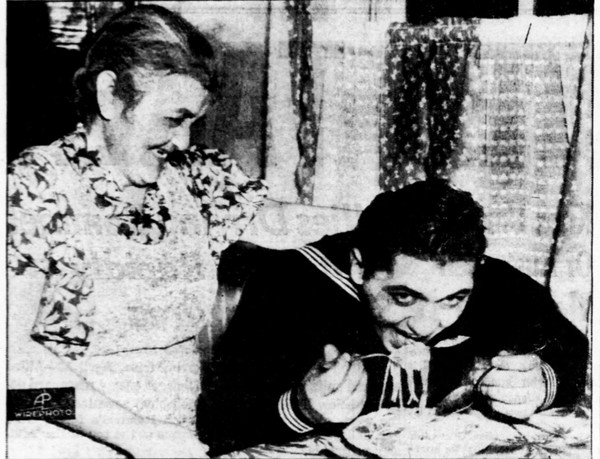
When Izzi was on the raft, the food he missed the most was his mother's spaghetti. She made it for him the first night after he got home.